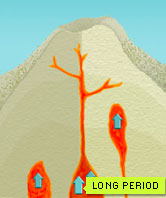
|
|
Long Period Event
Sudden changes in pressure within magma-filled cracks and
channels cause long-period (LP) events. LP events are
volcano-related earthquakes that are lower in frequency than
volcano-tectonic (VT) events. The frequency of LP events is
one half of a cycle to three cycles per second.
Unlike VT events, LP events can reveal magma flow and the
buildup of pressure within a volcano. This knowledge can help
seismologists predict eruptions.
|

The shaking that causes LP events is similar to the "water hammer"
that happens in household water pipes. When water is moving quickly
through a pipe and the faucet is turned off, the water is forced to
stop. But instead of coming to an abrupt stop, it bounces against
the closed valve, creating a wave of pressure that moves back and
forth within the pipe. The rate at which the wave bounces is
determined by the pipe's resonant frequency, a natural frequency of
vibration that is, in turn, determined by several factors, including
its length and shape. This bounce causes the pipe to clang loudly.
The same thing happens within a volcano's magma channel, except that
the channel's end is already closed, and the abrupt change is caused
by variations in the magma's pressure. Also, the frequency of the
bounce is much slower within the channel.
Volcano-Tectonic Event
| Long Period Event |
Tremor |
Hybrid
|
|


